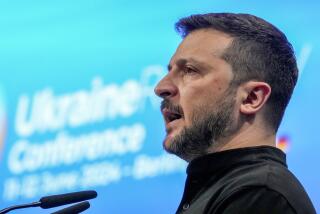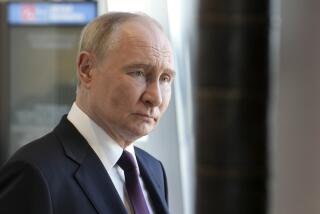Yeltsin Calls Russia a Foreign Investment Opportunity : Commerce: He assures Germans of most-favored trading status. Shoppers welcome him during Cologne stroll.
- Share via
BONN — Russian Federation President Boris N. Yeltsin said Friday that the Russian economy will be open for foreign investment in coming weeks and that Germany can expect “the greatest most-favored-nation status and freedom of trade possible.”
Yeltsin’s comments came as he met with political and industrial leaders on the second day of his first major foreign relations tour since the failed Kremlin coup effectively made him his nation’s most powerful leader.
“We need your help,” Yeltsin told 550 industrialists in Cologne as he appealed for more German trade and investment in Russia. “We are paying our debts,” he assured the industrialists, “and I guarantee you we are holding fast to a market economy.”
Yeltsin described privatization as the core of his economic reforms.
Although received cordially in Bonn, the rival of Soviet President Mikhail S. Gorbachev has not captured the hearts or the attention of a nation loyal to Gorbachev, the Nobel Peace Prize laureate who made German unification possible. But when Yeltsin walked through Bonn’s old marketplace, a few hundred shoppers and curious onlookers did gather to greet him and later to see him wave from the balcony of the fairy-tale-pretty pink Town Hall.
Yeltsin, so far, has managed to secure broad promises of German humanitarian aid to stave off hunger this winter in Russia and glimmers of interest in helping exploit the republic’s rich gas and oil resources. But no concrete figures have been discussed and no contracts have been signed.
Yeltsin plans to wrap up his visit today with a tour of Daimler-Benz headquarters in Stuttgart and a review of Soviet troops still stationed in eastern Germany.
Germany has agreed to pay the Soviet Union an estimated 1 billion marks ($625 million) to finance the withdrawal of the estimated 400,000 Red Army troops on German soil. The money is to be used to build housing for the returning soldiers.
Germany already is the Soviet Union’s largest trade partner and most generous donor of humanitarian aid. Kohl has pledged more help over the coming winter but is expected to bring pressure on the European Community and other Western nations to share the burden more evenly.
In a whirlwind round of visits Friday, Yeltsin expressed his concerns about forging a new confederation of republics from the old Soviet Union and tried to drum up support in reviving moribund Russian industry.
Although Russia, the largest and most populous republic in the Soviet Union, is rich in natural resources such as oil, gas and timber, it lacks the capital and expertise to fully tap them.
Yeltsin told Bonn politicians he holds little hope that the Ukraine, the second-most-powerful republic, will join the confederation.
“He has little hope it will take part,” said Karl Lammers, foreign policy spokesman for the ruling Christian Democrats.
After meeting with German Foreign Minister Hans-Dietrich Genscher, Yeltsin told reporters: “We discussed the problems of the Ukraine, which . . . could be complex for us, for the country and, of course, for Germany.”
Gorbachev has said Ukrainian participation is vital to any such confederation, given its vast industrial and economic resources and its control of southern warm-water ports important to Russia.
Yeltsin also met with President Richard von Weizsaecker, who toasted Yeltsin’s path of political and economic reforms.
One area in which Russia is looking to Germany for expertise is in establishing a central bank and market system, modeled after the powerful Bundesbank. Germany has promised to send experts. But German industrialists have expressed uneasiness over investing in Russia unless it becomes clear that a confederation will survive.
Russia--or any other Soviet republic or former East Bloc nation, for that matter--also must, in effect, compete in some instances for German capital and expertise in the private sector with the five new German states that once composed Communist East Germany. Faced with rebuilding the crippled eastern German economy, the government has offered various incentives for investors there.
More to Read
Sign up for Essential California
The most important California stories and recommendations in your inbox every morning.
You may occasionally receive promotional content from the Los Angeles Times.










